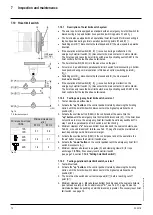
6
Operating
03.2018
55
ba
-o
.2
.6
.0
-us
-1.
1-
y
|
A
11
86
75
01
R
ev
A
A
35.
DO NOT
allow the rope or hook to be used as a ground for welding.
36.
DO NOT
allow the rope or hook to be touched by a live welding electrode.
37.
DO NOT
remove or obscure the warnings on the hoist.
38.
DO NOT
adjust or repair a hoist unless qualified to perform hoist maintenance.
39.
DO NOT
attempt to lengthen the wire rope or repair damaged wire rope.
40.
DO NOT
allow personnel not physically fit or properly qualified, to operate hoist.
41.
DO NOT
operate hoists unless hook moves in the same direction as indicated on the
push button. If opposite direction occurs, see pre-operation checks, Section II
Paragraph 2-4.b.
42.
DO NOT
operate hoist unless limit switches are operating properly.
43.
DO
avoid operating hoist when hook is not centered under hoist. Avoid side pulls and
swinging of load or load hook when traveling hoist.
44.
DO
operate hoist within recommended duty cycle and DO NOT jog unnecessarily.
45.
DO
conduct regular visual inspections for signs of damage and wear.
46.
DO NOT
operate the hoist with hooks that have opened up.
47.
DO
provide supporting structure that has an appropriate design factor based on the
load rating and dead weight of the hoist. If in doubt of the supporting structure's
strength, consult a structural engineer.
48.
DO NOT
use hoist in location that will not allow operator movement to be free of the
load.
49.
DO
, when starting to lift, move the load a few inches at which time the hoist should be
checked for proper load holding action. The operation shall be continued only after
the operator is assured that the hoist is operating properly and that the load is
supported in the center of the base bowl/saddle of the hook.
50.
DO
observe recommended inspection and maintenance procedures.
51.
DO
use common sense and best judgment whenever operating a hoist.
52.
DO NOT
remove drop lugs. Removal will create an unsafe operating condition.
53.
DO NOT
lift guided loads.
















































